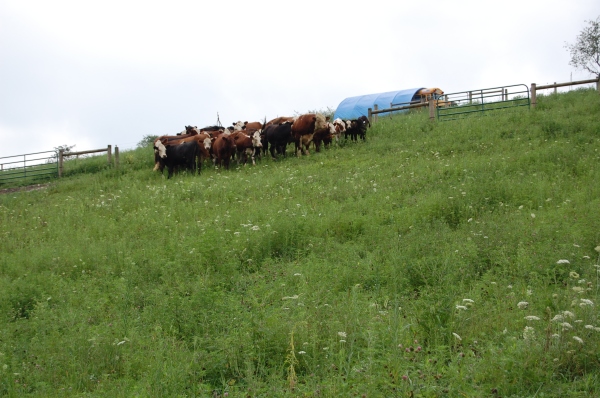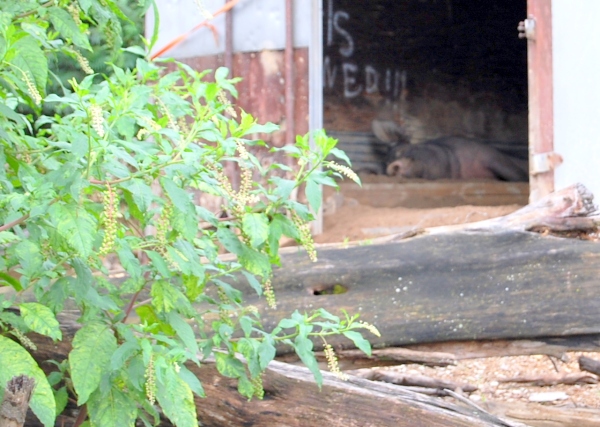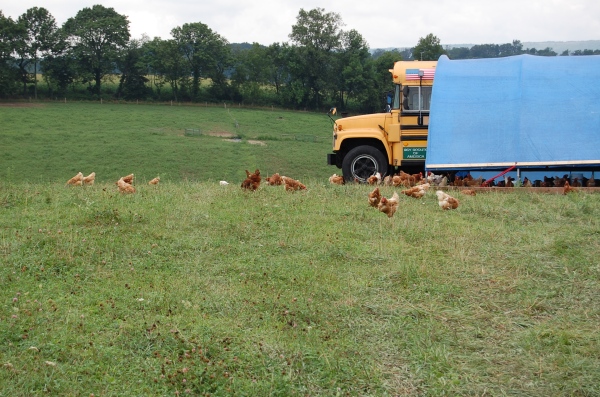Lately I’ve been looking into local, pasture-raised meats. My research made me want to find out how the food on my table is raised; and since I’m in Pennsylvania visiting my family this week, I took a field trip to a local farm to see what happy, pasture-raised animals are all about.
My parents live in Pennsylvania on the northern edge of the Lehigh Valley, an area that has been prime farm land since William Penn advertised his colony to German immigrants and the Lenape indians got fed up with the Europeans in the 1760s and left. It still is great farm land; the word bucolic comes to mind a lot around here. It only took a quick search on AgMap to find a long list of local farms in the area. Valley View Farm in Northampton, PA was close and seemed to raise their animals according to what I knew I wanted. Their animals receive no antibiotics, are pasture-raised and seem to live low-stress, happy lives. I called and asked if I could come by to see the place as well as pick up some eggs and meat.
The owners, Jim and Audrey Ayoub, were very pleasant and accommodating, and soon we were touring the beautiful farm. It’s a real working farm, unlike the agritourism places I’d visited in the past where you see only carefully staged parts of farm life. This farm has only been raising animals for a few years, so in place of historic barns and outbuildings, there are trailers for the pigs to live in and a school bus for the chickens (the school bus was my favorite, but more on that later). The best way for me to tell you about this farm is to show you the pictures.
Cows:
This is a shot of the farm looking down on one of the cows’ pastures. Notice the dark spot in the road across from the herd of cattle. It’s a bull that had escaped from the fencing. This seemed to really upset the herd since several of them kept calling to him.
When we got down to the area with the loose bull, Mr. Ayoub and his son came and got him back in his pasture.
I never expected to be quite this close to the bull, but he seemed very docile as he walked around our car.
The rest of the herd seemed much more upset than he did. Most of them were keeping an eye on us.
Pigs:
The pigs lived in a separate pasture which included a trailer for cover and an wooded area with mud and water which the pigs clearly enjoyed.
There were a few large hogs, some very young piglets and several slightly older immature pigs that were very curious.
By piggy standards this is the perfect place live and be happy. Look at the hog in this the trailer closely–you can see her smiling!
Chickens:
The baby chicks live in the barn until they are old enough to survive in the pasture. Some of these are turkeys which are already being raised for Thanksgiving. I don’t know which ones are which, but it isn’t necessarily just the larger ones. Little Guy came with us for the tour and he loved the chicks and kept talking about them. However, later when we asked him to tell what he liked about them, all he could come up with was that they were stinky. They were stinky, but they were also stinkin’ cute!
Once the chicks are old enough they make their way over to the pasture to enjoy the most interesting chicken coup I’ve ever seen.
That’s right, not only are these happy chickens, they go to school too! Not really. The bus has been retrofitted with egg-laying boxes and it provides an enclosure to protect the chickens at night. Even happy pasture-raised chickens like to come home to roost at night because there are a lot of animals that like nothing more than a chicken dinner in the middle of the night. The bus provides protection from wild animals and also from the elements. The tarp reduces the wind against the side of the bus.
However, the chicken story gets even better. The bus alone is not enough protection against the wild animals. These chickens also have a faithful, ever vigilant body guard. The guard is the newest member of the farm. We were told he’s working out so far. When he sees a wild animal he creates a commotion and scares it off. In return he gets to spend his days munching away on clover with several dozen chickens. Not really the worst life ever. We expected him to get annoyed by our presence too, but I think he was just hoping for a snack because he seemed pretty happy to see me.
Meat from the farm is processed by a local meat processor and packaged for sale. The farm sells chicken, beef, goat, lamb, turkey and pork at local farmers’ markets. They have a mobile store which goes from market to market.
Seeing the farm was a fascinating experience. As more of us become focused on how our food is produced, the market for places like Valley View Farm will grow. The benefits to us all go far beyond just having healthy food:
- Pastured animals distribute their manure directly back to the pasture instead of it going into a pile and running off into creeks in the next rain.
- Pastured animals require less fossil-fuel consumption.
- Pastured animals use little or no grain feed, thus reducing the burden on cultivated crops.
Please visit and support your local, sustainable farms.
Oh, and in my next post I will show you what I did with some of my purchases from the farm. Stay tuned!













Nice photos! Sounds like a wonderful place.
Thanks. It was a nice place!
Thank You for all the pictures and blog of our farm. We are glad you enjoyed your visit to our farm. We did too! Audrey Ayoub
Interesting article. Reminds me when we went to Vermont this summer, eating real food, while it is still fresh and knowing where it came from. Sounds like a good farm to purchase food from. Now, if we can only find something like that near Canton….
Good to read about the farm with all the pasture raised animals and of course trailers and the secure school bus.The pictures showing the herd of cattle, pigs, baby chicks were cute and gave us a feeling of having really visited the farm.The descriptions of various sections were interesting. It is true that by visiting farms we really become aware about the stages in food production before it reaches us.
Farms in Pennsylvania